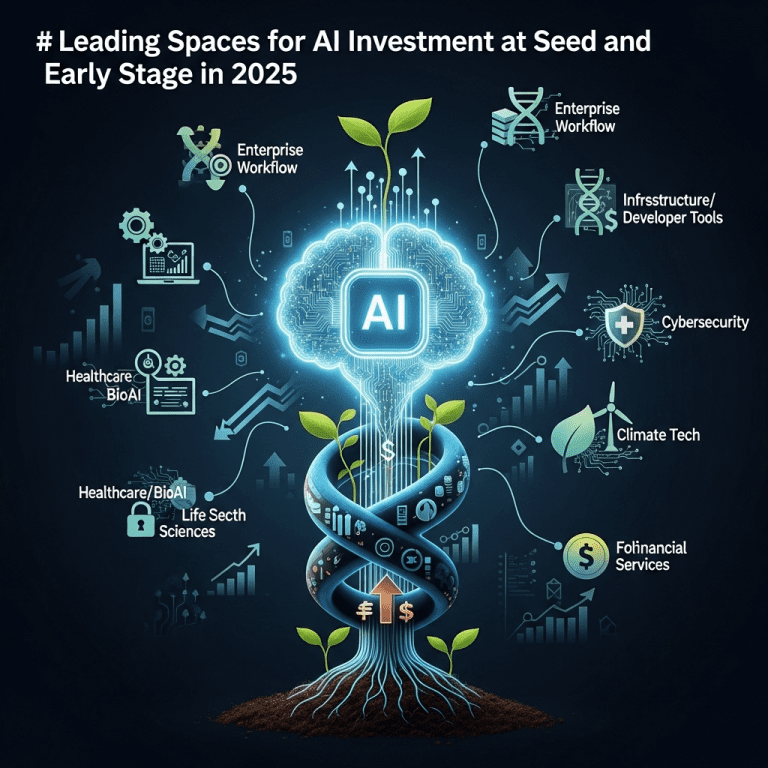The landscape for AI investment at seed and early stage has accelerated rapidly heading into 2025, offering venture capitalists and angel investors a multitude of promising sectors beyond the traditional AI mainstays. With generative AI breakthroughs and stronger global funding networks, early-stage AI startups are capturing significant attention. Here, we breakdown leading spaces poised to define the next wave of unicorns and exits.
Key Trends in AI Investment at Seed and Early Stage
The focus on AI investment at seed and early stage has shifted notably, thanks to advancements in large language models, foundation model APIs, and increased industry-specific adoption. According to recent data from PitchBook and CB Insights, early-stage funding rounds in AI reached over $20 billion globally in 2024, with a 16% year-over-year growth. Investors are moving past general AI applications and zeroing in on high-potential verticals that combine defensible data moats, regulatory awareness, and clear go-to-market roadmaps.
Generative AI for Enterprise Workflows
One of the most promising segments for seed and early-stage investment is generative AI tailored to enterprise workflows. SaaS startups leveraging generative AI capabilities for marketing automation, code generation, legal document analysis, and customer service augmentation are attracting record seed funding. These companies often focus on niche, high-impact workflows, providing clear ROI and faster adoption for enterprise clients.
AI Infrastructure and Developer Tools
Another critical area receiving substantial early-stage capital is AI infrastructure—tools enabling model deployment, observability, model security, and efficient integration with existing enterprise stacks. Startups building scalable data pipelines, fine-tuning platforms for custom models, and privacy-first inference engines are in high demand. As organizations look to operationalize AI, robust infrastructure startups are expected to drive strong returns for early investors.
Healthcare, Life Sciences, and BioAI: An Emerging AI Investment Frontier
The intersection of AI and life sciences has proven especially attractive for investment insights. Seed and early-stage funding in bioAI startups—focusing on drug discovery, diagnostics, and genomics—continues to set records. These companies benefit from the massive datasets generated by healthcare systems and the increasing ability of AI models to surface novel biological insights, thus creating defensible proprietary positions and longer-term exit opportunities.
AI-Driven Cybersecurity Startups
Against a backdrop of escalating global threats, AI-driven cybersecurity tools are experiencing a funding boom. At the seed stage, startups using AI for real-time threat detection, fraud prevention, and automated incident response are particularly attractive. Their potential integration into enterprise ecosystems aligns perfectly with investor appetite for scalable, mission-critical solutions.
Sector-Specific Verticals Leading AI Investment at Seed and Early Stage
While horizontal AI platforms receive attention, vertical-specific AI startups—like financial services AI for risk modeling or agri-tech applications for supply chain efficiency—are surging. Investors value their domain focus, faster distribution cycles, and ability to build industry-specific data advantages. The financial sector, in particular, is witnessing seed rounds for AI-driven compliance, embedded credit scoring, and next-generation robo-advisory solutions.
Climate Tech and AI
AI-driven climate tech is fast becoming another major area for early-stage investment. Startups combining AI with environmental data for emission tracking, clean energy grid optimization, or precision agriculture tap into urgent global priorities and significant government funding incentives. This focus is aligned with investor calls for impactful, sustainable technologies, as highlighted in sustainable finance reports.
AI for Human Productivity and Collaboration
Seed and early-stage VCs are also backing AI companies that enhance human productivity—tools that enable efficient remote work, team collaboration, and personal workflow automation. AI-enabled meeting assistants, productivity analytics, and smart communication platforms remain on the radar, especially as hybrid work models persist post-pandemic.
How Investors Can Identify Winning Early-Stage AI Startups
Due diligence at the seed stage now extends beyond technology evaluation to assessing founders’ domain experience, go-to-market plans, and ability to attract subsequent funding. Investors increasingly look for startups with unique datasets, clear regulatory compliance strategies, and early revenue signals. As covered in recent venture capital analyses, partnerships with incumbent industry leaders also indicate de-risked paths to scale for AI startups.
Conclusion: The Future of AI Investment at Seed and Early Stage
With the AI industry’s dynamism, the leading spaces for AI investment at seed and early stage will likely expand further throughout 2025. Investors seeking asymmetric returns should closely monitor enterprise generative AI, bioAI, climate tech, and sector-specific verticals. By focusing on defensible moats, differentiated technology, and experienced founders, backers can capture value at the ground floor of AI’s next innovation wave.









